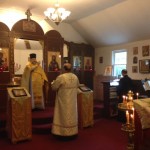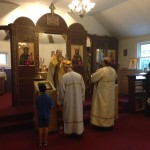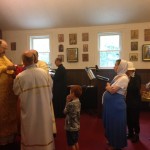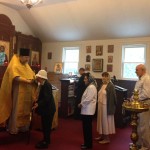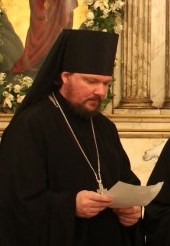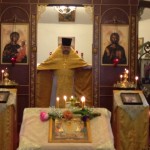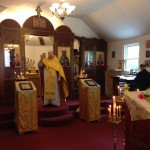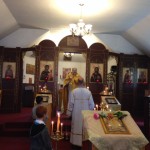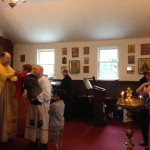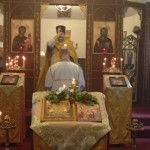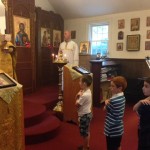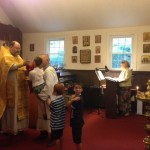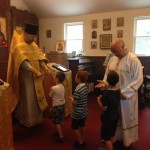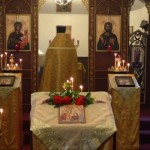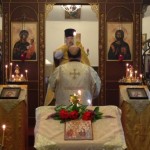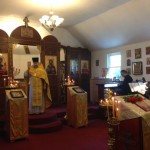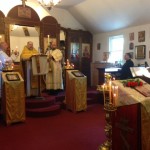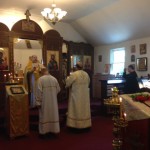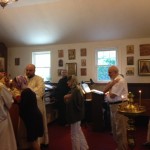On July 27, on the 7th Sunday after Pentecost, and Sunday of the commemoration of the Holy Fathers of the first six Ecumenical Councils, St. George Church’s Rector, Archpriest Igor Tarasov served the Divine Liturgy.
Following the readings from the Scripture he preached a homily:
“Today we have a double celebration: we celebrate Sunday, the day of the Resurrection of Christ. And today we also commemorate Holy Fathers of the first six Ecumenical Councils. The Gospel reading of this Sunday tells us about giving sight to the two blind men and healing of the man possessed by a mute demon. Another Gospel is the Pontifical Prayer of our Lord Jesus Christ at the Last Supper where He is praying to God the Father that His Disciples may have eternal life. And eternal life is to know the true God. We may add that tomorrow the Church will celebrate feast of St. Vladimir, the Baptizer of Rus’. I is also reminding us that due to the efforts of this holy man our people embraced Christianity, thus came to know the one and true God, thus could inherit that life for which our Lord prayed to God the Father.”
“Holy Fathers of the Six Ecumenical Councils in the course of several centuries (from the 4th until the 7th century) were working on defining the true Christian faith, were spelling out what orthodoxy means and in what we must believe in order to be saved. Following all these times in history, only in the 10th century, the people of Kievan Rus’ became the followers of Jesus Christ and confessors of the true faith.”
“True faith, knowing the true God gives eternal life. It also makes people seeing spiritual truth. While in today’s Gospel our Lord gave sight to the blind men who begged Him to have pity on them, acceptance and professing Christ gives all the people spiritual sight. Thanks to the Holy Fathers we may know how to use that sight and set it in a right direction. Thanks to St. Vladimir our ancestors stopped to be spiritually blind. True faith also makes people free from slavery to the evil one. While today’s Gospel tells about freeing a man from a mute spirit, acquiring and learning true faith sets us free from evil and from any wrong spirit or error. “You shall know the truth and the truth shall make you free” – says the Lord (Jn. 8, 32). Thanks to St. Vladimir our people renounced the idols and came to know the truth, came out from the darkness and blindness of paganism and received the light of Christ.”
“In our days many people tend to lose the truth and the light of Christ. Many wrong and false teachings overspread the earth. Statistics says that more than a half of the American people believe in reincarnation, believe that a human soul may live many times in different bodies. The teaching of Christ totally deny that. But many people who formally belong to Christian denominations privately believe in that heresy. Many today’s people believe in astrology, tend to admit that the stars and planets can rule our lives. All these people look like blind or possessed by demons. They may search for the truth, but look for it in the wrong places. They are not seek the truth in the right place because they are blind or possessed. They find something which seems to be the truth for them, but they are unable to make a right judgment. Even formal membership in the Church may not help them because they lack awareness and firm faith.”
“Only by the grace of God we may come to the truth, embrace the right belief and acquire the spiritual knowledge of God. Only by the light of our Lord Jesus Christ we may stop being spiritually blind. Only by the power of Christ we may be freed from the slavery to our primal enemy. Let us then appreciate and hold firmly our true faith, faith of our Lord Jesus Christ, faith defined by the Holy Fathers of the Councils, faith brought to us by St. Vladimir, faith which teaches us the truth, faith which is our eternal life.”
After the Liturgy dismissal the Rector expressed his gratitude to Reader Vladimir Piankov who substituted for our Choir Director Olga, for the labor he undertook in our temple and greeted him on the occasion of his coming name day. Traditional “Mnogaya leta” was sung.
Fr. Igor also notified the parishioners that His Eminence, Archbishop Justinian by the decision of the Holy Synod of the Russian Church, had been transferred to Russia. The new Administrator of our Patriarchal Parishes will be Hieromonk John (Roschin) who is elected to be a bishop. The Rector announced that Archbishop Justinian will serve his last Liturgy in America on Saturday, August 2, at St. Nicholas Cathedral and invite faithful to attend that service and to say farewell to His Eminence.

